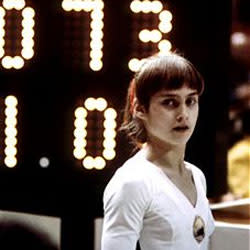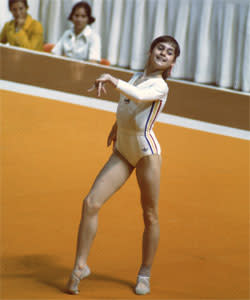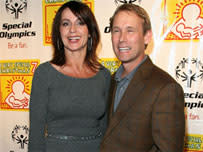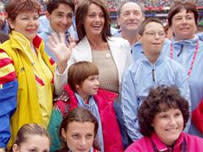Catching up with Nadia Comaneci

This week, I had the amazing opportunity to speak with one of my childhood heroes: Nadia Comăneci. One of my earliest memories is sitting in the attic at my mother's house and sifting through my older sister's "Nadia" scrapbook. One newspaper clipping read: "Queen of the 10." At just 14 years old she graced the cover of Time magazine with the headline "She's Perfect." Nadia made Olympic history at the 1976 Olympic Games in Montreal when, as a member of the Romanian team, she became the first gymnast ever to score a perfect 10. She went on to become the Olympic All-Around Gold Medalist at the Games, set all sorts of crazy records, and inspire young girls everywhere to attempt flips off the side of their sofas. Today, when she isn't playing the role of mom, she stays involved with the sport as a commentator and coach. She also works with the Special Olympics, where she serves as vice chair for the Special Olympics Board of Directors.
Nadia spoke with us from her kitchen in Norman, Okla. (where she had just finished making pancakes for her son Dylan, who recently turned 5). Nadia talked about growing up in Romania, her Olympic memories, kids and sports, and the upcoming Special Olympics World Games in Athens, Greece.
Shine:At the 1976 Summer Olympics in Montreal, you scored the first 10.0 on the uneven bars. What did that feel like?

Nadia Comaneci: I usually didn't watch the scoreboard, but I heard some noise in the arena, turned around, saw the scoreboard, and looked at my teammates because I didn't understand the 1.0. (The scoreboards were not equipped to display a 10.0, so the judges flashed a 1.0.) One of them said: "I think it's a 10." I didn't understand that it was the first in history. I realized a 10 was the best thing you could get, but I didn't realize how big that was.
Shine: What's your most memorable Olympic memory?
NC: Of course I should say the 10 on uneven bars, but then I got six more for a total of seven 10's, and I thought the judges were too good to me.
Shine: Béla Károlyi, one of the world's most prominent, and some would say controversial, coaches was on the sidelines as your coach. What did you learn from him?
NC: I consider him like my second family. I grew up with him. He is a big guy, and when you do gymnastics and you try new things, you are hoping that the coach spotting you will catch you before you hit the floor. He was demanding, but I liked that. I realized that we have to work hard to get somewhere. Otherwise, it's not easy to achieve something at the best level without hard work and discipline. Sometimes people are looking for the easy way to do things, and I don't think there are easy ways.
Shine: There is often discussion about there being too much pressure on young athletes, particularly gymnasts with their athletic peaks happening at such a young age and lasting for such a short window of time. Did you experience this, and how do parents know if they are pushing their kids too hard in sports?

NC:
I didn't feel like I had pressure when I was young because I was just going with the flow and doing what I liked to do. I think the pressure comes when you realize what people expect from you. I had no pressure when I was 12 or 13. Nobody put me on the cover of any magazines before I won the Olympics, so I didn't have any pressure. It was different when I went to the 1980 Games because I was the reigning Olympic champion and I knew what people were expecting of me, but I was grown up then. I don't think kids have pressure. In general, people talk about little girls: "She's working too hard." But not one person says a thing about a 7-year-old boy. I think that's not equal or related to the world we are living. People think we are too fragile, but just leave the girl alone. Maybe she is better than the boy and can handle it.
Shine: What was it like growing up as a gymnast in a communist country?
NC: You grow where you grow up. I didn't know the difference between a communist country or a free country when I was growing up. I was doing gymnastics; the government was providing for my training. When I was in my teenage years and I was traveling, I realized the difference between a communist system and the free world. But this is what you have and you just grow up in what you have. And then later if you want to do something else, you make the decision to stay or leave. I left. (In November 1989, Nadia defected to the U.S. from Romania. In 2001 she became a naturalized citizen of the U.S.)
Shine: What about when you're an older athlete, your body starts to change and you transition from what you have always known (the sport) to the unknown (life without the sport)?
NC: You go from a time when you are busy nonstop with all the hours of training and traveling and competing, and then you go off and you have nothing to do and you have to look around and think what have I learned and how can I apply this to whatever I want to do. If you have good people around you, it is an easy transition, but sometimes it is not easy. Wherever you go and whatever you do in your life, the basics of the things that I've learned through gymnastics are the same. You have to commit, you have to love what you do, you have to educate, you have to be a good motivator--it's pretty much the same.
Shine:How important is it for kids to get involved in sports?

NC: I got involved in sports because I had a lot of energy and I used to jump on the couch at home and destroy parts of furniture. My mom was looking for a place for me to use the energy. It was a coincidence that I did gymnastics. I didn't know where I was going, but I liked the atmosphere. I liked the fact that I was doing something that I couldn't do at home. I liked that I was learning to do tricks. I liked the idea that I was traveling and competing. It was very motivating for me. I think it is important for kids to do some kind of sport because it is good for you first of all, and it keeps you busy. I think as a parent, it is important to keep your kids busy and sports are the easiest way to hook your kids into it.
Shine: You serve as the vice chair for the Special Olympics Board of Directors. How did you get involved and why is this important to you?
NC: I got involved because my husband, Bart Conner (former American gymnast and gold medalist at the 1984 Olympic Games), has been with Special Olympics for more than 30 years. When I moved to the states in the '90s, he introduced me. You meet the kids and you go to the competition and you just get hooked and they become a part of your life. It is kind of a big family, the entire thing that is happening with the organization.

Shine:
The Special Olympics World Summer Games will take place in Athens this month. Seventhousand Special Olympics athletes from nearly 180 countries will compete in 22 Olympic-type sports.What are you most looking forward to about this year's games?
NC: Mostly just having fun and celebrating the athletes, the parents, and the volunteers, and to cheer the athletes on in the competition. We'd just like to encourage people to get involved in their local programs, be a part of the family, and to be a volunteer. Take your kids to competitions and teach them what Special Olympics is all about. We used to think that just being in the Special Olympics was a great thing, but now the athletes really want to win.
Related Stories:
WNBA's Candace Parker talks to Shine
Exclusive Shine interview with Maria Shriver
